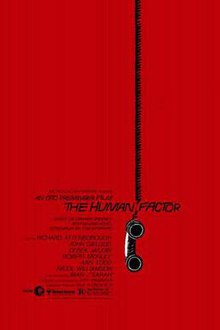The Human Factor (1979 film)
| The Human Factor | |
|---|---|
 Theatrical release poster by Saul Bass | |
| Directed by | Otto Preminger |
| Written by | Graham Greene Tom Stoppard |
| Starring | Richard Attenborough Derek Jacobi John Gielgud Nicol Williamson |
| Cinematography | Mike Molloy |
| Edited by | Richard Trevor |
| Music by | Richard Logan Gary Logan |
| Distributed by | Metro Goldwyn Mayer United Artists |
Release date |
|
Running time | 115 mins |
| Country | United Kingdom |
| Language | English |
| Box office | $376,050[1] |
The Human Factor is a 1979 British thriller film starring Richard Attenborough, Nicol Williamson, Derek Jacobi, and John Gielgud. It is based on the 1978 novel The Human Factor by Graham Greene, with the screenplay written by Tom Stoppard.[2] It examined British espionage, and the West's relationship with apartheid South Africa.
The film was directed by Otto Preminger, the 38th and final film he helmed in his nearly half-century career.
Plot
Maurice Castle (Nicol Williamson) is a mid-level bureaucrat in MI6 whose life seems completely without peculiarity, peccadillo, or any highlighting quality to suggest he’s anything but a dull bureaucrat, except for the interesting, casually introduced detail that he has an African wife, Sarah (Iman), and son, Sam (Gary Forbes). Meanwhile, the company regime, represented by corpulent, bluffly cheery Dr. Percival (Robert Morley), who’s actually an expert in assassinations and biological toxins, and grey eminence Sir John Hargreaves (Richard Vernon), advise newly appointed security chieftain Daintry (Richard Attenborough) that, thanks to a source they have cultivated in their Moscow enemy headquarters, they believe they have a traitor at the MI6 African desk. The duo determine that the mole must be quietly killed, rather than be allowed publicity in a trial or a flight to Moscow. They determine quickly that the most likely candidate for the traitor is Arthur Davis (Derek Jacobi), Castle’s playboy office partner. Actually, Castle is the mole, but the information he leaks is entirely unimportant financial documents. He became involved in leaking to the Soviets when he was an MI6 agent in South Africa, seven years earlier: he met and fell in love with Sarah, and when their affair was discovered by the authorities, Castle was all but thrown out of the country, and he entrusted Sarah’s smuggling out of the country to a mutual communist acquaintance. Ever since, he’s been repaying the favor by filtering insignificant data to the Soviets. Castle makes one last informational drop to his communist handlers and he is summarily whisked off to Moscow for protection. However, Castle's primary problem is that he is not a communist, is not a communist sympathizer, and has absolutely no interest in politics, socialism, the Russian language, Slavic history or culture, geopolitical power plays, Moscow nor the Soviet Union. His only interest is in his wife and his son, who are left in London — where they will remain separated from him. [3]
Cast
- Richard Attenborough - Colonel Daintry
- John Gielgud - Brigadier Tomlinson
- Derek Jacobi - Arthur Davis
- Robert Morley - Doctor Percival
- Joop Doderer - Cornelius Muller
- Ann Todd - Castle's Mother
- Richard Vernon - Sir John Hargreaves
- Angela Thorne - Lady Hargreaves
- Nicol Williamson - Maurice Castle
- Iman - Sarah
Production
The film was shot in Kenya and at Shepperton Studios near London. As with the book, much of the theme about alleged treason and suspicion are based on the defection of Kim Philby, a friend of Graham Greene, to the Soviets. The movie also introduced Iman, who was working as a model before she began to work in movies.
Preminger had trouble securing funding for the film and had to partially fund it with his own money.[4] Reportedly, Preminger wanted to cast the novelist Jeffrey Archer in the role played by Nicol Williamson. Archer, much shorter than Iman, failed his audition.[5]
References
- ^ http://www.boxofficemojo.com/movies/?id=humanfactor.htm
- ^ http://ftvdb.bfi.org.uk/sift/title/122957
- ^ Roderick Heath, "The Human Factor" Review, 14 May 2011 http://thisislandrod.blogspot.com/2011/05/human-factor-1979.html
- ^ Nat Segaloff, Final Cuts: The Last Films of 50 Great Directors, Bear Manor Media 2013 p 234-235
- ^ "Rose Tobias Shaw, casting director - obituary". The Daily Telegraph. 10 November 2015. Retrieved 11 November 2015.
External links
- 1979 films
- 1970s spy films
- British films
- British spy films
- Cold War spy films
- British thriller films
- English-language films
- Films directed by Otto Preminger
- Films based on works by Graham Greene
- Metro-Goldwyn-Mayer films
- United Artists films
- Films based on British novels
- Screenplays by Tom Stoppard
- 1970s romantic drama films
- 1970s drama films
- Films shot in Buckinghamshire
